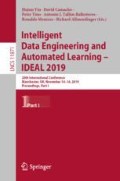Abstract
Recommender Systems (RSs) are supporting users to cope with the flood of information. Collaborative Filtering (CF) is one of the most well-known approaches that have achieved a widespread success in RSs. It consists in picking out the most similar users or the most similar items to provide recommendations. Clustering techniques can be adopted in CF for grouping these similar users or items into some clusters. Nevertheless, the uncertainty comprised throughout the clusters assignments as well as the final predictions should also be considered. Therefore, in this paper, we propose a CF recommendation approach that joins both users clustering strategy and items clustering strategy using the belief function theory. In our approach, we carry out an evidential clustering process to cluster both users and items based on past preferences and predictions are then performed accordingly. Joining users clustering and items clustering improves the scalability and the performance of the traditional neighborhood-based CF under an evidential framework.
Access this chapter
Tax calculation will be finalised at checkout
Purchases are for personal use only
Notes
References
Su, X., Khoshgoftaar, T.M.: A survey of collaborative filtering techniques. Adv. Artif. Intell. 2009, 1–19 (2009)
Sarwar, B.M., Karypis, G., Konstan, J., Riedl, J.: Recommender systems for large-scale e-commerce: scalable neighborhood formation using clustering. In: International Conference on Computer and Information Technology, Dhaka, Bangladesh. IEEE (2002)
Dempster, A.P.: A generalization of Bayesian inference. J. Roy. Stat. Soc. Ser. B (Methodol.) 30, 205–247 (1968)
Shafer, G.: A Mathematical Theory of Evidence, 1st edn. Princeton University Press, Princeton (1976)
Smets, P.: The transferable belief model for quantified belief representation. In: Smets, P. (ed.) Quantified Representation of Uncertainty and Imprecision. HDRUMS, vol. 1, pp. 267–301. Springer, Dordrecht (1998). https://doi.org/10.1007/978-94-017-1735-9_9
Masson, M.H., Denoeux, T.: ECM: an evidential version of the fuzzy c-means algorithm. Pattern Recogn. 41(4), 1384–1397 (2008)
Denoeux, T.: A K-nearest neighbor classification rule based on Dempster-Shafer theory. IEEE Trans. Syst. Man Cybern. 25, 804–813 (1995)
Zhang, J., Lin, Y., Lin, M., Liu, J.: An effective collaborative filtering algorithm based on user preference clustering. Appl. Intell. 45(2), 230–240 (2016). https://doi.org/10.1007/s10489-015-0756-9
Xue, G.R., et al.: Scalable collaborative filtering using cluster-based smoothing. In: ACM SIGIR Conference on Research and Development in Information Retrieval, pp. 114–121. ACM (2005)
O’Connor, M., Herlocker, J.: Clustering items for collaborative filtering. In: ACM SIGIR Workshop on Recommender Systems, vol. 128. UC Berkeley (1999)
Abdelkhalek, R., Boukhris, I., Elouedi, Z.: Towards a hybrid user and item-based collaborative filtering under the belief function theory. In: Medina, J., et al. (eds.) IPMU 2018. CCIS, vol. 853, pp. 395–406. Springer, Cham (2018). https://doi.org/10.1007/978-3-319-91473-2_34
Su, X., Khoshgoftaar, T.M.: Collaborative filtering for multi-class data using Bayesian networks. Int. J. Artif. Intell. Tools 17, 71–85 (2008)
Elouedi, Z., Mellouli, K., Smets, P.: Assessing sensor reliability for multisensor data fusion within the transferable belief model. IEEE Trans. Syst. Man Cybern. Part B Cybern. 34, 782–787 (2004)
Author information
Authors and Affiliations
Corresponding authors
Editor information
Editors and Affiliations
Rights and permissions
Copyright information
© 2019 Springer Nature Switzerland AG
About this paper
Cite this paper
Abdelkhalek, R., Boukhris, I., Elouedi, Z. (2019). Joining Items Clustering and Users Clustering for Evidential Collaborative Filtering. In: Yin, H., Camacho, D., Tino, P., Tallón-Ballesteros, A., Menezes, R., Allmendinger, R. (eds) Intelligent Data Engineering and Automated Learning – IDEAL 2019. IDEAL 2019. Lecture Notes in Computer Science(), vol 11871. Springer, Cham. https://doi.org/10.1007/978-3-030-33607-3_34
Download citation
DOI: https://doi.org/10.1007/978-3-030-33607-3_34
Published:
Publisher Name: Springer, Cham
Print ISBN: 978-3-030-33606-6
Online ISBN: 978-3-030-33607-3
eBook Packages: Computer ScienceComputer Science (R0)

